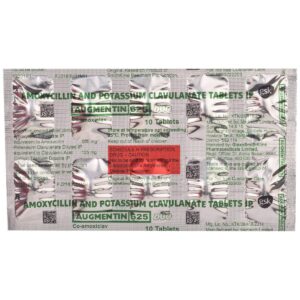Augmentin 625 is a combination antibiotic that contains amoxicillin and potassium clavulanate. It is prescribed to treat bacterial infections such as pneumonia, urinary tract infections, skin infections, and ear infections. Augmentin 625 is a prescription medication that should only be administered by a trained medical professional.
Augmentin 625 Duo.Buy Now
Dosage:
The dose of Augmentin 625 may differ depending on the severity of the sickness, as well as the patient’s age, weight, and overall health. The adult dosage is one tablet (625 mg) every 12 hours. Children’s doses will vary based on their weight and age.
It is vital that you take your prescription exactly as prescribed by your doctor. Even if your symptoms improve, do not skip doses or stop taking the medication before the time restriction has expired. Stopping the medicine too soon may result in a return of the illness.
Side effects:
Augmentin 625, like many other medications, may cause side effects. Some side effects may fade on their own as the body adjusts to the drug, and they do not affect everyone who takes it. However, if the side effects persist or worsen, it is vital to see a healthcare professional as soon as possible. Augmentin 625 often causes the following side effects:
- Diarrhea
- Nausea
- Vomiting
- Stomach pain
- Headache
- Dizziness
- Skin rash
- Itching
Get medical help right away if you develop any of the following adverse effects:
- Severe diarrhea
- Difficulty breathing
- Swelling of the face, lips, tongue, or throat
- Severe skin rash or blistering
- Jaundice (yellowing of the skin or eyes)
Precautions:
Before using Augmentin 625, make sure your doctor is aware of any allergies or medical conditions you have. If you have a history of liver or kidney disease, you must see your doctor about the risks and advantages of taking the medicine.
Augmentin 625 may interact with a number of medications, including blood thinners, oral contraceptives, and probenecid. Inform your doctor about any medications you are currently taking before starting Augmentin 625.
Unless recommended by a doctor, Augmentin 625 should not be taken during pregnancy. It is also not recommended for nursing women since it may enter breast milk and harm the newborn.
Conclusion:
Augmentin 625 is an antibiotic that is effective against bacterial infections. It is critical to follow the doctor’s instructions carefully and to alert them of any allergies or medical difficulties before starting the medication. Augmentin 625, like other medications, can have side effects; if they continue or worsen, get medical attention immediately. If the necessary precautions are taken and the prescribed dose is followed, Augmentin 625 can successfully treat bacterial infections.

